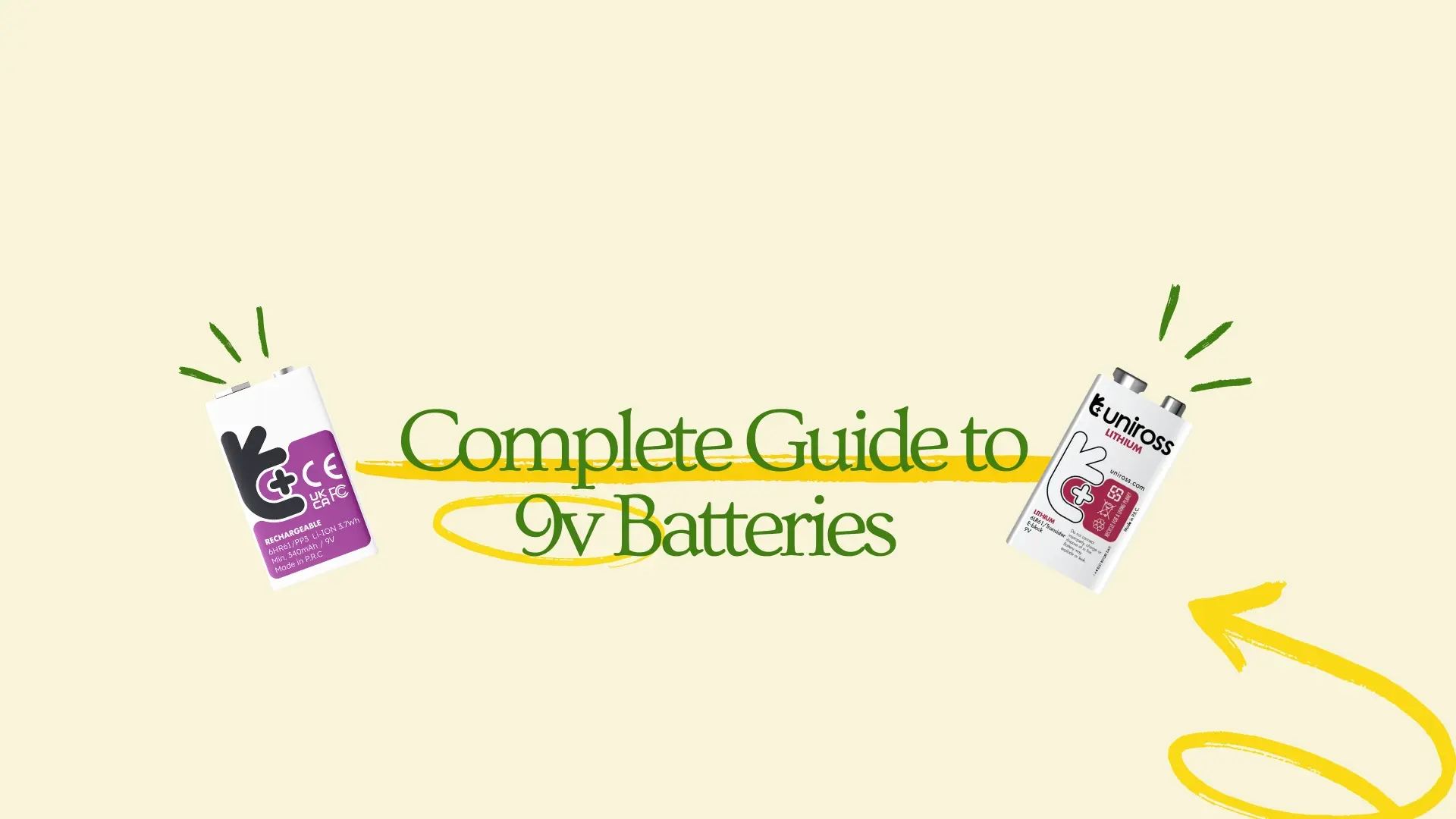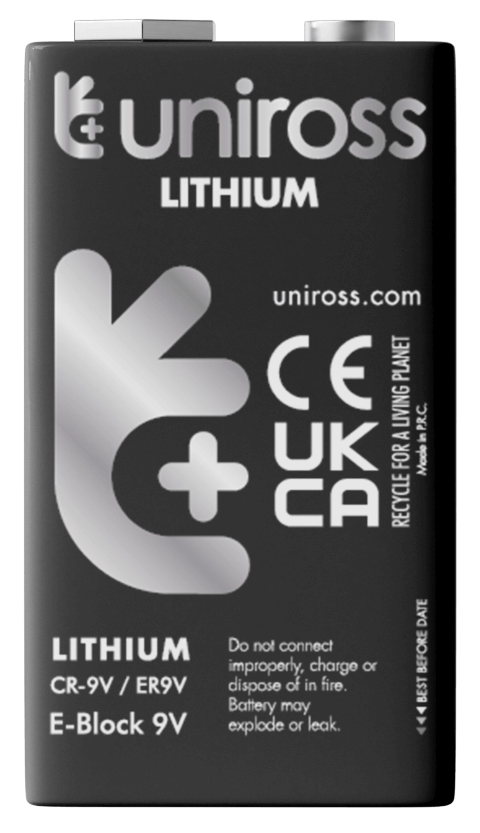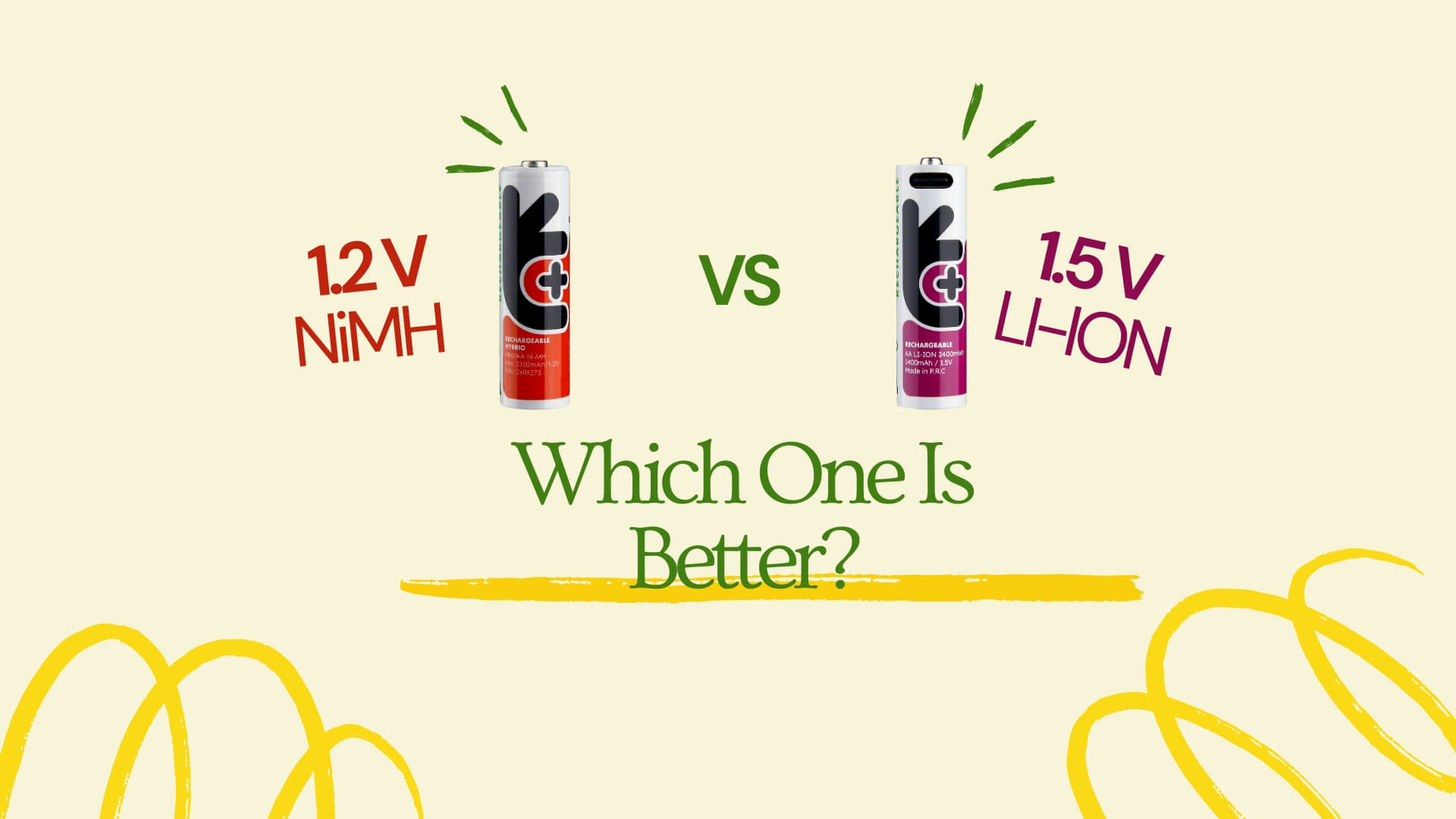What are 9V Batteries?
9V battery is a compact power source delivering 9 volts of electrical energy. Its distinctive rectangular shape and snap-style connector make it easily identifiable. These batteries consist of six individual 1.5V cells connected in series, packaged in a standard size of 48.5mm × 26.5mm × 17.5mm.
Key Specifications:
- Voltage: 9V nominal
- Capacity: 400mAh-1200mAh (varies by type)
- Terminal Type: Snap connector with positive and negative terminals
Types of 9V Batteries
Primary Batteries
Alkaline 9V Batteries
Alkaline batteries are the most common and widely available 9V batteries. These batteries provide reliable power with a capacity ranging from 400-600mAh, making them perfect for everyday devices. Their stable discharge rate and consistent voltage output make them ideal for smoke detectors, portable radios, and other low-to-medium drain devices.
What makes alkaline batteries particularly attractive is their excellent balance of cost and performance. With a shelf life of up to 7 years when stored at room temperature, they offer great value for intermittent use devices and emergency backup power. These batteries perform optimally in normal temperature conditions (60°C to -40°C) and are environmentally safer than many other primary batteries due to their zero mercury content.
Lithium 9V Batteries
Lithium 9V batteries represent the premium segment of primary batteries, offering exceptional performance characteristics. With an impressive capacity of 600-1200mAh, they provide nearly double the power of standard alkaline batteries. Their most notable feature is the ability to maintain stable voltage output throughout the entire discharge cycle, ensuring consistent device performance.
These batteries excel in extreme temperatures, functioning reliably from -40°C to 60°C, making them perfect for outdoor equipment. Their ultra-long shelf life of 10+ years makes them ideal for emergency kits and critical applications. Though they come with a higher initial cost, their longer operational life and superior energy density often make them more cost-effective in the long run, especially for high-drain devices and medical equipment.
Zinc-Carbon 9V Batteries
Zinc-Carbon batteries, also known as “Heavy Duty” batteries, represent the most basic and economical 9V battery chemistry. These batteries use a zinc anode, manganese dioxide cathode, and ammonium chloride or zinc chloride electrolyte. With a typical capacity of 200-400mAh, they provide adequate power for low-drain devices and basic applications.
While they offer the lowest initial cost among all 9V batteries, their performance and shelf life are more limited. They work best in room temperature conditions and are ideal for devices with intermittent use patterns like remote controls or simple electronic toys. Their shelf life typically ranges from up to 4 years, though performance may decline over time, especially in challenging environmental conditions.
Rechargeable 9V Batteries:
NiMH (Nickel-Metal Hydride) 9V Rechargeable Batteries
NiMH batteries offer an environmentally friendly alternative to disposable batteries, capable of up to 500 full charge cycles when properly maintained. With a typical capacity of 200mAh per charge, they provide reliable power for regular-use devices like wireless microphones and test equipment. While they have a slightly lower initial voltage of 8.75V compared to primary batteries, their performance remains consistent throughout their discharge cycle.
These batteries excel in high-usage scenarios, offering quick charging capabilities typically requiring only 2-4 hours for a full charge. Unlike older rechargeable technologies, NiMH batteries have minimal memory effect, making them more user-friendly and reliable for everyday use. Their cost-effectiveness becomes apparent in applications requiring frequent battery changes.
Lithium-ion 9V Rechargeable Batteries
Lithium-ion Batteries offer an impressive 1000+ charge cycles and maintain a high capacity of 500mAh per charge.
While they require specialized charging equipment and have a higher initial cost, their superior performance and longevity make them the preferred choice for professional equipment and high-end devices. Built-in protection circuits prevent overcharging and deep discharge, enhancing safety and battery life. The absence of memory effect means they can be charged at any time without losing capacity, offering ultimate flexibility for users.
Comparison of Primary Battery Chemistry:
| Feature | Zinc-Carbon | Alkaline | Lithium |
|---|---|---|---|
| Capacity | 200-400mAh | 400-600mAh | 600-1200mAh |
| Shelf Life | 2-3 years | 5-7 years | 10+ years |
| Cost | $ | $$ | $$$ |
| Best Use Case | Basic electronics, occasional use | Regular use devices | High-drain & critical devices |
| Temperature Range | 0-40°C | 0-40°C | -40°C to 60°C |
Applications and Uses
9V batteries power a wide range of devices across household, professional, and industrial applications. Understanding where these batteries work best helps in choosing the right type for specific needs.
Safety and Security Devices
Smoke detectors and carbon monoxide alarms rely heavily on 9V batteries as their primary or backup power source. These devices typically use alkaline or lithium batteries due to their long shelf life and reliable performance. For optimal safety, manufacturers recommend replacing these batteries annually, even if they haven’t lost power.
Professional Equipment
Many professional testing and measurement devices use 9V batteries. Multimeters, sound meters, and electrical testers prefer 9V batteries for their stable voltage output and compact size. For these applications, high-quality alkaline or rechargeable lithium-ion batteries are recommended due to their consistent performance and reliability.
Musical Equipment
Guitar pedals, wireless microphones, and small preamps commonly use 9V batteries. Musicians often choose rechargeable options like NiMH or Li-ion for regular rehearsals and performances, while keeping alkaline batteries as reliable backups for live shows.
Industrial Applications
Industrial sensors, portable testing equipment, and emergency lighting systems often incorporate 9V batteries. These applications typically require batteries with high reliability and long shelf life, making lithium batteries the preferred choice despite their higher cost.
Battery Installation and Maintenance
Proper Installation
- Always check device polarity markings before installation
- Ensure clean contact points for optimal power transfer
- Never force a battery into position
- Replace all batteries in a device at the same time
- Don’t mix different battery types or ages
Storage Guidelines
Store 9V batteries in a cool, dry place at room temperature (20°C/68°F). Avoid extreme temperatures as they can significantly reduce battery life and performance. Keep batteries in their original packaging or use terminal covers to prevent accidental short circuits.
Maintenance Tips
- Regularly check devices for battery corrosion or leakage
- Clean battery contacts with a dry cloth if needed
- Remove batteries from devices not in use for extended periods
- Check battery voltage periodically in critical devices
- Keep spare batteries readily available for essential equipment
Frequently Asked Questions (Faq)
How long do 9V batteries last?
Battery life depends on the chemistry type and device usage:
Regular Use Devices (2+ hours daily):
Zinc-Carbon: 1-2 months
Alkaline: 3-6 months
Lithium: 6-12 months
Rechargeable NiMH: 2-3 months per charge
Lithium-ion: 3-4 months per charge
Low-Drain Devices (Smoke Detectors):
Alkaline: Up to 1 year
Lithium: Up to 2 years
Not recommended: Zinc-Carbon, Rechargeable
What devices typically use 9V batteries?
- Smoke detectors
- Carbon monoxide alarms
- Multimeters and test equipment
- Guitar pedals
- Wireless microphones
- Portable radios
- Small electronic toys
- Medical devices
- Transistor radios
Should I use rechargeable 9V batteries in smoke detectors?
No. Most smoke detector manufacturers specifically recommend against using rechargeable batteries because:
- They discharge more quickly
- Voltage drops more suddenly
- May not provide reliable warning when power is low Always use new alkaline or lithium batteries for safety devices.
We recommend using lithium batteries for best long run performance.




